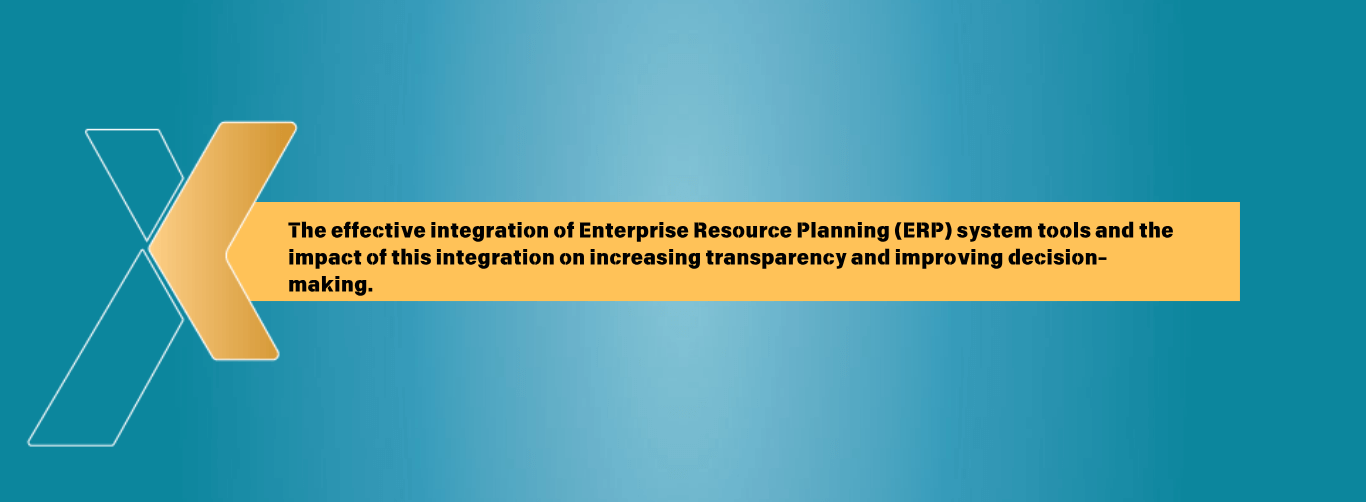The effective integration of Enterprise Resource Planning (ERP) system tools and the impact of this integration on increasing transparency and improving decision-making.
The effective integration of Enterprise Resource Planning (ERP) system tools and the impact of this integration on increasing transparency and improving decision-making.
discover | Friday - 30 / 05 / 2025 - 1:41 pm
In today’s business market, companies can no longer rely on fragmented data or hasty, unconsidered decisions. Every successful company now needs a clear and comprehensive view of everything happening within it (starting at daily operations and till reaching financial figures). For this reason, ERP (Enterprise Resource Planning) systems have become extremely important. These systems collect data from all departments in one place and create integration across all company processes.
The benefits of these systems are not limited to improving operational efficiency; they also enhance internal transparency and provide managers with accurate, real-time information to make strategic decisions.
This article explains how ERP systems contribute to boosting transparency and improving decision-making efficiency, helping companies grow and compete confidently.
How do ERP systems increase transparency and improve decision-making?
Answer is as follows:
Enterprise resource planning (ERP) systems play a pivotal role in enhancing transparency within companies and directly contribute to improving decision-making. This is achieved through a set of integrated functions, the most prominent of which are:
1- Data consolidation from various sources:
ERP systems collect data from various company departments, such as finance, inventory management, sales, and human resources, all within a single central database. This process creates a unified version of the data that enables all teams to confidently refer to, thus making decisions based on accurate, reliable, and consistent information.
2- Instant and comprehensive reporting:
ERP systems provide immediate and comprehensive visibility into the company’s situation. This is achieved through interactive dashboards and live performance indicators.
Rather than waiting days or weeks for reports, managers can access up-to-date data in real time, giving them the ability to detect trends early and address problems before they escalate.
3- End-to-end process tracking:
ERP systems enable monitoring of every step of the operational process, from customer orders through delivery to collection. This complete oversight provides a comprehensive view that helps identify bottlenecks or delays, while clearly defining responsibilities.
As a result, overall performance improves and accountability within the organization increases.
4- Supporting accurate and effective decision-making:
Because ERP systems provide up-to-date and reliable data, they significantly reduce reliance on guesswork or incomplete information.
In addition to the above, the predictive analytics tools built into these systems enable predicting the potential outcomes of decisions, supporting faster and more accurate decision-making. In this way, the company becomes better able to adapt to changes and take informed, timely action.
5- Enhancing collaboration between departments:
By providing a unified view of data and processes, ERP systems contribute to enhancing communication between different teams and departments. This, in turn, reduces the emergence of barriers that hinder transparency and increases the effectiveness of team coordination.
ERP systems also provide a digital infrastructure that helps organizations operate more efficiently and with greater transparency. As a result, decision-making becomes clearer and more strategic, fostering sustainable and consistent company growth.
Now, having reviewed in the previous paragraphs how Enterprise Resource Planning (ERP) systems contribute to improved decision-making, we will discuss the smart solutions offered by Logix, which aim to enhance transparency and support effective decisions within organizations.
Logix AI: Your Strategic Partner for More Effective Decisions!
Logix AI helps organizations improve decision-making in a smarter way by harnessing the power of data and artificial intelligence in several vital areas, including:
1- Inventory Ordering Report:
Provides a comparison between product profitability and holding costs, helping optimize resource allocation.
– Inventory Views Report: Highlights products that occupy a large amount of space despite low demand.
– Average Daily Sales Reports: Reveal popular products and help review and adjust purchasing policies based on actual performance.
2- Fraud Detection and Security Enhancement:
The system uses artificial intelligence and machine learning technologies to analyze data and detect unusual patterns as follows:
– The system proactively detects fraud attempts in real time.
– The system continuously learns from new data, enhancing the accuracy of predictions and reducing security risks.
3- Improving Customer Experience:
By analyzing customer data, the system can:
– Identify customers at risk of abandonment and take proactive actions such as providing personalized offers or improving service.
– Analyze negative feedback to identify opportunities for improvement and enhance the user experience.
4- Risk Management and Stability Enhancement:
The system offers comprehensive risk assessment tools, including:
– Analyzing diverse data to identify potential risks early.
– Providing clearer insight into supply chain disruptions.
– Periodically assessing supplier performance, helping anticipate challenges and make better decisions.
5- Improving Operations and Increasing Efficiency:
The system contributes to the consolidation of data and processes by:
– Automating repetitive tasks to relieve the burden on employees and enable them to focus on strategic tasks.
– Streamlining the supply chain and improving inventory management.
– Speed up order processing, enhancing customer experience and increasing customer satisfaction.
What value does Logix system offer its customers?
Logix AI system goes beyond being just a technical tool; it serves as a strategic partner that helps organizations develop their businesses and achieve better results.
Logix AI system is also characterized by its ability to continuously evolve, as its use contributes to improving administrative performance, enhancing decision-making, and gaining deeper insights that positively impact the organization’s long-term financial results.
Don’t wait for the future; take the initiative now to shape it by leveraging the advanced technologies provided by Logix AI system. This enables you to focus on growth and development while technology manages operational complexities.
